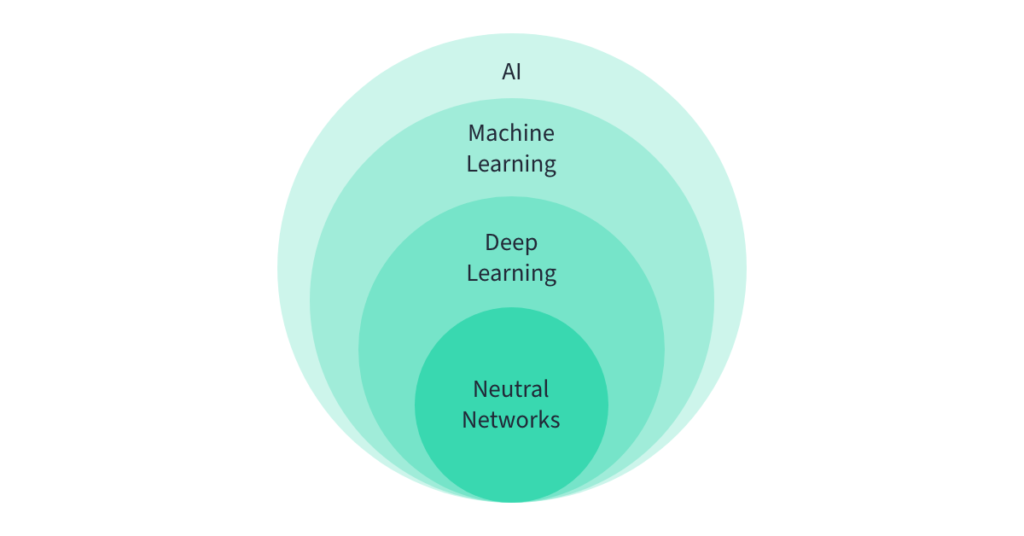Technology is our future in human life. Advancements in these sectors have continued to change the society we live in throughout the years, and it shows no signs of slowing down. Due to the current technological level, the development of machine learning is now gaining momentum. Practical use of it in digital products is not only possible but sometimes even necessary. And it has no intention of leaving the spotlight anytime soon.
What is machine learning?
Machine learning (ML) allows computers to learn without having to be programmed.
It’s a data analysis method that uses artificial intelligence tools to automate the process of developing analytical models. Computers can autonomously use the data and adapt their analytical models to changing events and requirements using learning algorithms. By acquiring new knowledge, it improves their capacity to solve the provided challenges.

How does machine learning work?
The ability to evaluate enormous volumes of data (Big Data) is a relatively new programming approach and also a new way to communicate with machines. Instead of telling the computer what to do, we build a model from sample inputs, and the machine learning algorithm detects patterns in the data turning them into instructions.
The concept comes from artificial intelligence. It has derived from pattern recognition as the feature of repeatability is critical in machine learning. When coming across new data, they can adapt and use the existing experience to deliver consistent, repeatable outcomes with new input.
Why is machine learning important?
Machine learning is used in situations where explicit algorithms cannot be designed. Some examples are search engines, spam filtering, or OCR. It enables automatic development models capable of analyzing larger and more complicated data sets while delivering reliable analytical findings faster. This also allows companies to discover new prospects while avoiding previously unforeseen risks. And the growing interest in machine learning is a result of recent technological advancements.
Types of machine learning
In ML, there’s a model that must be taught. The model interprets the data it receives. Traditional machine learning techniques are classified into three major groups:
- Supervised learning – the most popular paradigm, you present the computer with sample inputs and desired outputs, and its goal is to learn a rule that relates inputs to outputs. In other words, it’s telling the supervised learning algorithm what is what, to match it further. An example could be face or speech recognition.
- Unsupervised learning – unlike supervised learning, this method is not labeled. It detects structure in its input on its own. As data is collected, an unsupervised learning algorithm looks for patterns in the data, their commonalities, and behaves accordingly, based on the existence or lack of those patterns. This model is used for example in buying habits systems or other sequence analyses.
- Reinforcement learning – this machine learning model is different from supervised or unsupervised learning as it’s inspired by behaviorist psychology. The reinforcement learning algorithm is about teaching how to behave by giving data set input and giving feedback about how well it works. It tries to maximize the reward. It’s often used in video games, self-driving cars, or traffic light control.

Machine learning and other AI models
It’s no secret that the terms data science and machine learning are hot topics in the tech world today. Across industries, from hardware startups, finance majors to governmental institutions, teams are working feverishly on their AI strategy.
Artificial intelligence
AI is the umbrella term for all learning subcategories. Machine learning comes as the first subset, followed by deep learning, and then neural networks.

Deep learning
This sort of machine learning is referred to as “deep” because it uses numerous layers of a neural network and makes significant use of complicated data sets. It’s based on artificial neural networks with 3 or more layers. Deep machine learning stands as a pillar of cognitive computing. Often it is utilized in applications including image categorization, or pharmacological analysis.
Neural networks
An artificial neural network mimics the neurons in the human brain. It’s made up of clusters that collaborate to give the desired result. Neural amplification, like in the human brain, improves pattern recognition, expertise, and learning in general. Its use cases range from forecasting and marketing research to risk assessment in the financial sector.
The benefits of machine learning for digital products
Machine learning helps to examine information more intelligently. In most businesses that rely on big data analytics, this solution is well-liked and widely used. The capacity to pull hidden insights from data helps to run companies more effectively. When you use machine learning, you may get a competitive advantage in a variety of ways.
Automation
Intelligent process automation is a word for automation with the use of machine learning. For many organizations, data input is one of the most time-consuming tasks, and this technology can automate it by extracting and categorizing the required data appropriately. It’s a critical component of technologies like predictive analytics or artificial intelligence. Because machine learning is automated, it may save time and money by freeing up developers and analysts to do work that computers can’t do.
Better performance
Business automation not only allows you to do activities more quickly but also decreases the risks of human mistakes. That’s also why the manufacturing industry uses this technology – machine learning helps in the development of highly effective predictive maintenance programs by reducing unexpected failures and decreasing the need for preventive maintenance. As a result, employees can take action to avoid negative impacts. Long term, machine learning assists businesses in more scheduling maintenance tasks.
Reliability and accuracy
When it comes to data security, machine learning can considerably reduce risks. Improved cybersecurity has the potential to address attacks for many businesses across the world. Intelligent algorithms can acquire and analyze data regarding cyber risks and respond in real-time. Furthermore, machine learning software may identify even little changes. It also influences the financial industry. By adding cognitive computing technologies to raw data, ML can not only detect but also forecast fraud in high-volume transactions.
Sales and marketing strategy
With more valuable and relevant data, machine learning analysis may be used to make modifications to a company’s marketing and sales strategy. It can result in increasing sales or cross-selling. Retail businesses by using the recommendation engine will make product searches easier and real-time targeted advertising could be created on the websites. Machine learning also can analyze a customer’s purchase history and personalize the shopping experience further. All of this leads to higher revenue and nowadays many modern companies are looking forward to adopting it on their applications.
Example of machine learning applications – Bench by Applover

As a result of growing data volumes, simple access, and affordable storage, the field of machine learning has seen significant growth. Companies try to apply innovative ML algorithms to their business operations. As mentioned before, some of the machine learning use cases are in the industries like healthcare, transport, financial services, sales and marketing, or public administration.
At the Applover team, we have developed a tool for recruiting top talents in the projects. Using ML, Bench helps you in creating the perfect development team and provides you exactly what you need. It works with a database of developers and all of the candidates are selected depending on the business requirements. Machine learning algorithm matches the client with a built team, making it ready to subscribe for the project.
With the use of ML matching algorithms, we could save time and automate the process. The goal was to make it as simple and effective as possible. Bench takes care of all the paperwork so clients can focus on the essential things. It improves customer experience and leverages the time for product development.
Contact
Do you want to find out more about machine learning?
The future of AI in digital products
There are some myths about artificial intelligence taking over the world, but the majority of them come from science fiction culture. AI advances are beginning to have an influence that will help society and companies in addressing a broader set of challenges. The usage of AI in many industries already has increased by 270% in the last 4 years. According to recent consumer studies, consumers also value a variety of daily technologies that would be hard to implement without AI.
Today, AI is a great technology that can change any organization and make it more productive and customer-centric. The main point is that machine learning brings up new business opportunities. Any company can take advantage of that.
Investing in machine learning
No matter the industry you operate in, implementing machine learning for your digital product may help you take a competitive advantage. Not taking it into account would be missing an opportunity. To fully understand its potential, understand how to integrate it with appropriate tools. See if this solution can be applied to your project. Of course, adopting machine learning technologies isn’t easy, so you’ll need an experienced partner. For more, check out the article on how to find a software development partner.

